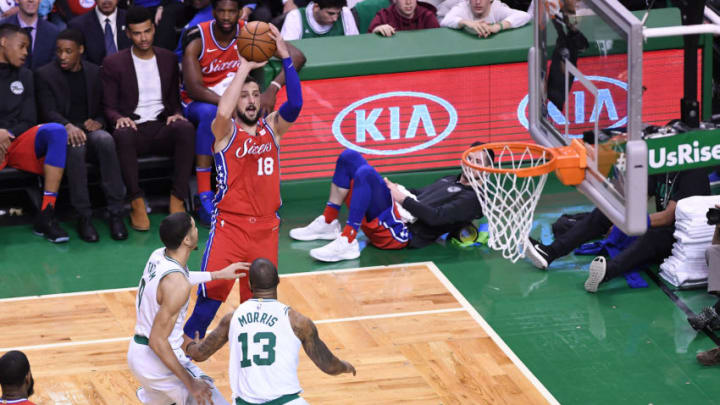The Philadelphia 76ers have lacked a solid wing rotation for most of the year, and the Boston Celtics exposed that in game one. How can Brett Brown fix it?
In game one of the Eastern Conference semifinals, the Philadelphia 76ers‘ wing defense played a major role in the team’s 117-101 loss. Perimeter players like Ben Simmons, Robert Covington, Marco Belinelli, and (sometimes) Dario Saric posted poor plus-minuses and had trouble containing the Celtics’ second-string squad.
The Celtics did not have Kyrie Irving, Gordon Hayward, nor Jaylen Brown for the first game of the series, yet they still ran Philly out of the gym. Thanks to Belinelli’s plus-minus of -23, Simmons’ -21, Saric’s -20, and Covington’s -13, the Sixers simply looked inferior compared to Jayson Tatum and Terry Rozier’s prolific scoring.
Obviously, the Sixers will always lose if those crucial players perform so poorly, but Brown could have made strategic decisions to disrupt Boston’s runs and make life harder for Rozier, Tatum, and the rest of their opponents.
More from The Sixer Sense
- 3 Sixers players who could help Team USA Basketball
- 76ers 2k24 ratings: 3 most underrated players on Philadelphia roster
- 76ers head coach Nick Nurse bares lofty plans for Paul Reed this season
- Grade the Trade: 76ers swap Tobias Harris for superstar PG in mock deal
- Sixers Podcast: Danny Green returns + James Harden bombshell
As the game went on, it became clear that Covington had no interest or ability to cover anyone on Monday. Rather than banking on unathletic sharpshooters to mitigate the Celtics’ exploitation of RoCo’s defensive deficiencies, Brett Brown should have opted against fighting fire with fire and instead should have used Justin Anderson to try and stop the Boston youth. Anderson provides the Sixers with the athleticism, defensive ability, and passion that the team needed to step up on the defensive end.
Although Anderson’s three-point percentage of 33 percent on the year shows he resembles a random number generator from beyond the arc, the University of Virginia product has a knack for hitting shots and helping his teammates build momentum and confidence.
Game one also exacerbated the absence of Timothe Luwawu-Cabarrot. The raw wing has performed inconsistently since he entered the league, but standing at 6-6 with a 6-11 wingspan, he provides a super long and quick obstacle for defenders to navigate.
Using Justin Anderson more would give Simmons and Covington a similar replacement when the two starters rest, but the two Sixers stars need to live up to their reputations as two of the league’s best perimeter defenders. No one should expect that more minutes for Simba will cure the Philadelphia 76ers of all the ills they showed in game one, but his presence on the court would make life harder for the Celtics’ best offensive players.
Next: 3 adjustments worth making in Game 2
It will be hard for the Sixers’ primary outside defenders to play worse than they did in game one, but in order to win in the Eastern Conference semifinals, every player needs to play to the best of their abilities. That tradition applies to the Sixers, but Brett Brown needs to take responsibility and do what is right for his team, which is using Anderson to counteract the threats Tatum and Rozier pose.
